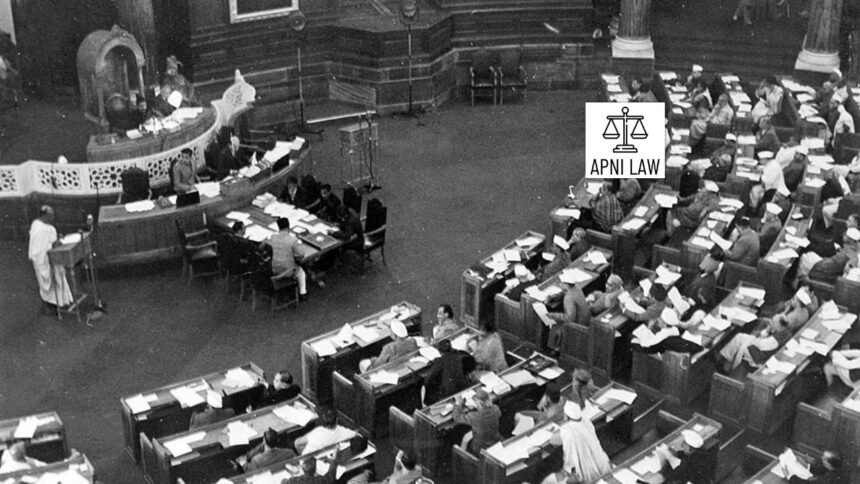Introduction
The Directive Principles of State Policy (DPSPs) are among the most dynamic and forward-looking parts of the Indian Constitution. They were included in Part IV (Articles 36–51) to guide the State in creating laws and policies that promote justice, equality, and the welfare of people. However, the framers knew that society would evolve and new challenges would arise. To address these changes, Parliament has expanded the scope of DPSPs through constitutional amendments. These additions reflect India’s growing commitment to environmental protection, education, welfare, and international cooperation. Examining these amendments shows how DPSPs have adapted over time to meet modern needs.
The 42nd Amendment of 1976: Expanding the Social and Environmental Vision
One of the most significant moments in the history of DPSPs came with the 42nd Constitutional Amendment of 1976, often called the “mini-Constitution.” This amendment was passed during the Emergency and is remembered for its wide-ranging changes. In terms of Directive Principles, it marked a turning point. Parliament inserted Article 39A, which directs the State to provide free legal aid so that justice is not denied due to poverty. It also introduced Article 43A, encouraging the participation of workers in the management of industries. Alongside these, Article 48A was added, requiring the State to protect and improve the environment and safeguard forests and wildlife. These changes reflected India’s evolving priorities: access to justice for weaker sections, empowerment of workers, and urgent concern for environmental conservation.
Article 39A: Free Legal Aid for Justice
The addition of Article 39A was revolutionary because it directly addressed the barriers that low-income groups face in accessing justice. Before this amendment, many people could not approach courts simply because they lacked resources. By mandating free legal aid, the Constitution recognized that equality before the law (Article 14) would remain meaningless if people could not defend their rights. Over the years, this principle inspired legal aid services across states, the establishment of Legal Services Authorities, and free legal camps. Landmark cases like Hussainara Khatoon v. State of Bihar (1979) strengthened this directive by linking it with the right to life and personal liberty.
Article 43A: Workers’ Participation in Industry
The framers had already included provisions for fair wages and labor welfare, but the 42nd Amendment went further by introducing Article 43A. It recognized that democracy should not stop at political participation; it should extend into workplaces as well. This directive urged the State to ensure workers had a voice in managing industries. While implementation has been patchy, the principle set a foundation for cooperative management practices and collective bargaining, reflecting a socialist tilt in India’s constitutional vision.
Article 48A: Protecting the Environment
Perhaps the most visionary addition of the 42nd Amendment was Article 48A. For the first time, the Constitution explicitly required the State to protect the environment, forests, and wildlife. In the years following, Parliament enacted laws like the Environment Protection Act of 1986, which gave practical effect to this principle. The judiciary also played a vital role by interpreting Article 48A alongside Article 21, expanding the right to life to include the right to a clean and healthy environment. This principle gained more importance as industrialization and urbanization brought new environmental challenges.
The 44th Amendment of 1978: Focus on Agricultural Workers
The 44th Amendment of 1978 added a clause to Article 38, emphasizing that the State must minimize inequalities not just among individuals but also among groups and regions. It also revised Article 39, requiring the State to ensure that children are not forced to work in jobs unsuited to their age or health. At the same time, the amendment expanded Article 43, directing the State to promote cottage industries and secure a decent standard of life for agricultural workers. These changes highlighted the importance of rural development and social equity, reinforcing the welfare-oriented approach of DPSPs.
The 86th Amendment of 2002: Education as a Priority
Another milestone was the 86th Constitutional Amendment of 2002, which gave priority to children’s education. This amendment inserted a new Article 21A, making free and compulsory education a Fundamental Right for children aged six to fourteen. To harmonize this right with the DPSPs, Article 45 was revised to provide for early childhood care and education until children reach six years of age. Additionally, Article 51A was expanded to impose a fundamental duty on parents to provide education to their children. This coordinated framework reflected the recognition that education is not only a directive but a cornerstone of democracy and empowerment.
The 97th Amendment of 2011: Strengthening Cooperative Societies
The 97th Constitutional Amendment of 2011 added Article 43B, directing the State to promote cooperative societies. The idea was to strengthen democratic functioning in these bodies and ensure that they operate in a professional, autonomous, and transparent manner. Cooperative societies, especially in rural India, have played a crucial role in supporting farmers, artisans, and small-scale industries. By elevating them to the level of a directive principle, the Constitution reinforced the idea of economic democracy and collective welfare.
Impact of New DPSPs on Indian Democracy
The new Directive Principles added through amendments have enriched the Constitution by making it responsive to modern challenges. They show that the Constitution is not a frozen document but a living charter. Free legal aid has made justice more accessible. Environmental protection has become a constitutional priority. Education has moved from being an aspiration to a right, ensuring that future generations are empowered. Workers’ rights and cooperative societies reflect the Constitution’s concern with inclusive economic growth. Together, these directives have strengthened India’s democratic framework by addressing gaps that were not fully visible at the time of independence.
Challenges in Implementation
Despite these achievements, the implementation of new DPSPs faces hurdles. Free legal aid often suffers from lack of funds and awareness. Worker participation in industries remains weak, with decision-making still concentrated in management hands. Environmental protection faces a constant battle with industrial and infrastructural expansion. Cooperative societies in many states struggle with corruption and political interference. Similarly, access to quality education continues to be unequal, especially in rural and marginalized areas. These gaps show that while constitutional directives set high goals, their realization depends on political will, resources, and effective administration.
FAQs
Which new Directive Principles were added by the 42nd Amendment?
The 42nd Amendment added Article 39A on free legal aid, Article 43A on workers’ participation in industries, and Article 48A on environmental protection.
How did the 86th Amendment change education in India?
The 86th Amendment made education a Fundamental Right through Article 21A, revised Article 45 to focus on early childhood care, and imposed a duty on parents to provide education.
Why was Article 43B on cooperative societies added?
The 97th Amendment of 2011 added Article 43B to strengthen cooperative societies, ensuring they function democratically, professionally, and transparently for the benefit of their members.
Conclusion
The Directive Principles of State Policy are the moral heart of the Constitution. Through amendments, they have expanded to cover new priorities like legal aid, workers’ rights, environment, education, and cooperative societies. These additions reflect how India’s democracy continues to evolve with changing needs. Although challenges remain in implementation, the amendments demonstrate that DPSPs are not static ideals. They are living principles that adapt to new realities and push the nation toward greater justice, equality, and welfare. By keeping them relevant through amendments, the Constitution ensures that India’s democratic journey stays rooted in both progress and compassion.
For any specific query call at +91 – 8569843472








